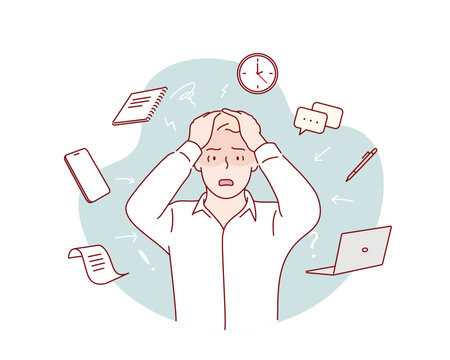Recognizing the signs of burnout is essential for protecting your mental and physical health. Burnout is a state of emotional, physical, and mental exhaustion caused by prolonged stress, often related to work or caregiving responsibilities. If left unaddressed, burnout can lead to serious health issues and impact your overall quality of life.
Here are 10 common signs of burnout and practical steps you can take to recover and regain balance.
1. Chronic Fatigue and Low Energy
One of the earliest signs of burnout is persistent fatigue. You may feel physically and emotionally drained, even after a full night’s sleep.
How to Recover:
- Prioritize rest and sleep to recharge your energy.
- Incorporate relaxation techniques, such as meditation or deep breathing, into your daily routine.
- Take regular breaks throughout the day to avoid overexertion.
2. Difficulty Concentrating
Burnout can make it hard to focus, remember details, or complete tasks efficiently. You may feel mentally foggy or easily distracted.
How to Recover:
- Break tasks into smaller, manageable steps to reduce overwhelm.
- Use tools like to-do lists or time management apps to stay organized.
- Practice mindfulness to improve focus and clarity.
3. Increased Irritability or Mood Swings
Burnout often leads to heightened irritability, frustration, or mood swings. You may find yourself snapping at others or feeling overwhelmed by minor inconveniences.
How to Recover:
- Identify triggers that contribute to your irritability and address them.
- Practice self-compassion and remind yourself that it’s okay to feel stressed.
- Seek support from friends, family, or a therapist to process your emotions.
4. Loss of Interest in Work or Hobbies
A common sign of burnout is losing interest in activities you once enjoyed, including work, hobbies, or socializing. This can lead to feelings of detachment or apathy.
How to Recover:
- Reconnect with activities that bring you joy, even in small ways.
- Set boundaries to create time for hobbies and relaxation.
- Consider taking time off work to reset and recharge.
5. Physical Symptoms Without a Clear Cause
Burnout can manifest as physical symptoms, such as headaches, muscle tension, digestive issues, or frequent illnesses. These symptoms often result from chronic stress.
How to Recover:
- Focus on physical self-care, including regular exercise and a balanced diet.
- Stay hydrated and avoid excessive caffeine or alcohol consumption.
- Consult a healthcare professional to rule out underlying medical conditions.
6. Feeling Cynical or Negative
Burnout can cause a shift in your outlook, leading to feelings of cynicism, negativity, or hopelessness. You may feel disconnected from your work or question its value.
How to Recover:
- Reflect on your goals and values to reconnect with your sense of purpose.
- Focus on positive aspects of your work or life, no matter how small.
- Seek professional support to address negative thought patterns.
7. Decreased Productivity
Burnout often leads to a noticeable decline in productivity and performance. Tasks that once felt manageable may now feel overwhelming or impossible to complete.
How to Recover:
- Set realistic goals and prioritize tasks based on importance.
- Delegate responsibilities when possible to lighten your workload.
- Celebrate small accomplishments to rebuild confidence and motivation.
8. Withdrawal from Social Interactions
Burnout can make you feel isolated or withdrawn. You may avoid social interactions, even with close friends or family, due to exhaustion or irritability.
How to Recover:
- Reach out to trusted friends or family members for support.
- Schedule regular social activities to stay connected, even if they’re brief.
- Consider joining a support group to connect with others experiencing similar challenges.
9. Feeling Overwhelmed or Out of Control
Burnout can leave you feeling like you’re constantly behind or unable to keep up with demands. This sense of overwhelm can lead to anxiety or feelings of helplessness.
How to Recover:
- Break large tasks into smaller, manageable steps to regain control.
- Practice stress management techniques, such as journaling or yoga.
- Seek guidance from a mentor, supervisor, or therapist to develop coping strategies.
10. Neglecting Self-Care
When experiencing burnout, self-care often takes a backseat. You may skip meals, neglect exercise, or sacrifice sleep to keep up with demands.
How to Recover:
- Make self-care a non-negotiable part of your routine.
- Schedule time for activities that nourish your mind and body, such as reading, walking, or meditating.
- Seek professional help if you’re struggling to prioritize self-care.
How to Recover from Burnout
Recovering from burnout takes time and intentional effort. Here are some additional strategies to help you regain balance:
- Set boundaries: Learn to say no to tasks or commitments that exceed your capacity.
- Take time off: Use vacation days or mental health days to rest and recharge.
- Seek professional support: A therapist or counselor can help you develop personalized strategies for managing stress and preventing burnout.
Recognizing and Addressing Burnout
Recognizing the signs of burnout is the first step toward recovery. By addressing these symptoms early and taking proactive steps to care for your mental and physical health, you can regain energy, motivation, and a sense of balance.
If you’re struggling with burnout, my private practice in Melrose, MA offers therapy and stress management services to help you recover and build resilience. Visit my services page to learn more about how I can support your journey to well-being.
External Resources for Burnout Recovery:
- American Psychological Association – Burnout – Expert advice on recognizing and managing burnout.
- Mental Health America – Burnout Prevention – Tools and strategies for preventing and recovering from burnout.
Start taking steps today to address burnout and prioritize your mental health for a healthier, more balanced life.

